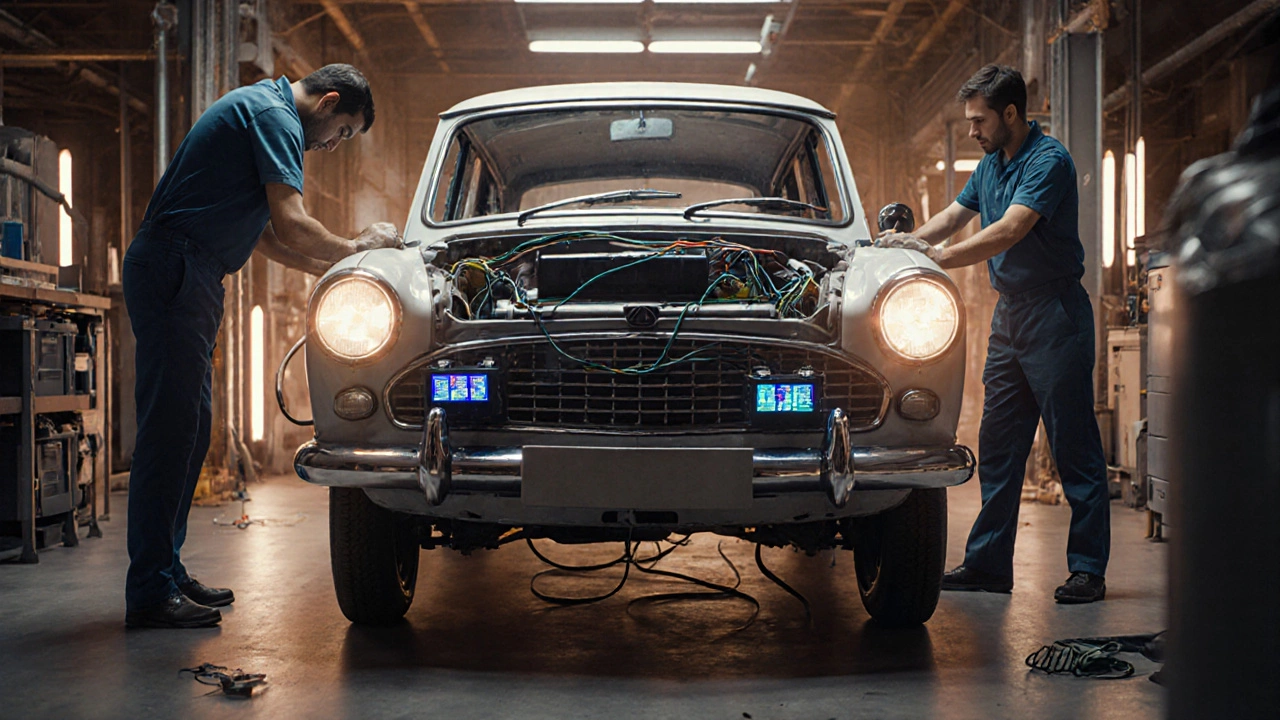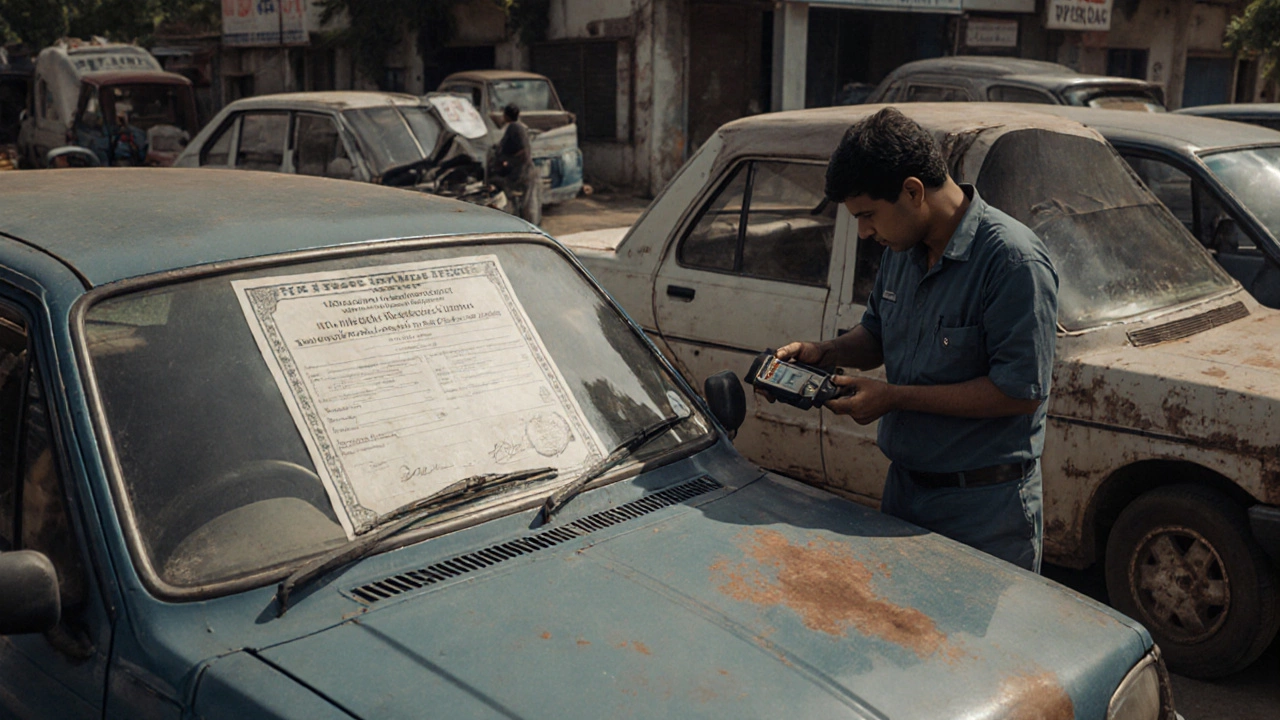Car Scrappage Value Estimator
Estimate the value of your vehicle if you choose to scrap it under India's Voluntary Vehicle Scrappage Program. The calculator shows the estimated scrap value based on vehicle type and age, plus additional incentives available.
If you own a car older than 15 years in India, you might have heard rumors about it being banned. The truth isn’t as simple as a blanket ban-but there’s a real rule that affects how you can use, renew, or sell your vehicle. This is the 15-year car rule in India, and it’s not about taking cars off the road overnight. It’s about safety, pollution, and making sure older vehicles don’t become a burden on the system.
What Exactly Is the 15-Year Car Rule?
The 15-year rule isn’t a law passed by Parliament. It’s a guideline issued by the Ministry of Road Transport and Highways (MoRTH) India’s central authority responsible for national road transport policies and vehicle regulations and enforced by state transport departments. The rule states that personal vehicles older than 15 years cannot be renewed for regular use unless they pass a fitness test and are re-registered.
For commercial vehicles like taxis and trucks, the limit is 10 years. That’s stricter. But for private cars, the 15-year mark is the cutoff. After that, you can’t just walk into a Regional Transport Office (RTO) and pay a fee to renew your registration. You have to prove your car is still roadworthy.
This rule was introduced in 2018 as part of the broader Vehicle Scrappage Policy A government initiative to retire old, polluting vehicles and encourage the purchase of newer, cleaner models. The goal? Reduce air pollution, improve road safety, and push people toward newer cars with better emissions control.
How Does the Fitness Test Work?
If your car is 15 years old and you still want to drive it, you must take it to an authorized testing center. These centers are run by the RTO or certified private garages. The test checks:
- Brake efficiency and alignment
- Steering and suspension wear
- Exhaust emissions (must meet BS-IV standards or higher)
- Body corrosion and structural integrity
- Lighting, mirrors, and windshield condition
- Presence of seat belts and airbags (if originally fitted)
The test isn’t easy. Many older cars fail because of rusted chassis, worn-out brake lines, or engines that leak oil and smoke. Even if your car runs fine, one cracked bracket or a faulty oxygen sensor can make it fail.
There’s no pass/fail score. The inspector decides based on safety and environmental risk. If your car passes, you get a fitness certificate valid for five years. After that, you must test again. If it fails, you can’t renew registration. That means you can’t legally drive it on public roads.
What Happens If You Don’t Pass the Test?
There are two options: scrap the car or sell it to someone in a state that doesn’t enforce the rule strictly.
Most people choose to scrap. India’s Voluntary Vehicle Scrappage Program A government-backed scheme offering incentives to trade in old vehicles for new ones gives you cash incentives-up to ₹1 lakh for cars and ₹2 lakh for SUVs-if you scrap through an authorized center. You also get discounts on new cars from participating manufacturers.
Some owners try to sell their 15+ year old cars to people in rural areas or smaller towns where enforcement is weak. That’s risky. If caught, you could face fines, impoundment, or even criminal charges for operating an unregistered vehicle. And if you’re involved in an accident, your insurance won’t cover you.

Does the Rule Apply to All States Equally?
Technically, yes. The rule comes from MoRTH, so it’s national. But in practice, enforcement varies.
In cities like Delhi, Mumbai, Bengaluru, and Pune, the RTOs are strict. They check registration papers during traffic stops and even use automated systems to flag expired fitness certificates. In smaller towns or states like Bihar, Jharkhand, or Odisha, enforcement is patchy. You might see older cars driving around-but that doesn’t mean it’s legal.
Also, cars registered before 2010 (when the rule was introduced) were given a grace period. Some of those vehicles are now 18-20 years old and still on the road. But if they’re ever re-registered-for example, if the owner moves to a new state-they’ll be required to go through the fitness test.
What About Classic Cars and Vintage Vehicles?
If your car is a 1970s Maruti 800 or a 1980s Ambassador, you might think it’s exempt. It’s not. But there’s a special category: Vintage Vehicles Cars over 50 years old that are preserved for historical or cultural value.
Under the Vintage Vehicle Policy, cars older than 50 years can be registered as “vintage” if they’re in original condition. These vehicles are exempt from the 15-year rule-but only if they’re driven sparingly. You can’t use them as daily transport. They’re meant for exhibitions, parades, or occasional drives.
To qualify, you need to submit photos, original documents, and proof of restoration. The RTO then issues a special vintage plate. These cars don’t need annual fitness tests. But they can’t be used for commercial purposes or daily commuting.
Why Was This Rule Introduced?
India’s air quality in major cities has been a crisis for years. According to the Central Pollution Control Board (CPCB) India’s primary agency for monitoring and controlling environmental pollution, vehicles contribute to nearly 20% of urban air pollution. Older cars-especially those with carburetors and no catalytic converters-emit up to 10 times more pollutants than modern ones.
Take a 2005 Maruti Alto. It runs on BS-III fuel and emits around 1.8 grams of CO per kilometer. A 2024 Alto, running on BS-VI fuel, emits just 0.2 grams. That’s an 89% reduction.
Also, older cars are more likely to break down. A 2022 study by the Automotive Research Association of India (ARAI) India’s leading automotive R&D organization that tests vehicle safety and emissions found that 68% of road accidents involving vehicles over 15 years old were due to mechanical failure.
The rule isn’t about punishing owners. It’s about protecting public health and safety.

What Are the Alternatives to Keeping an Old Car?
You don’t have to keep driving a 15-year-old car to get value from it.
- Scrap it and get cash: Authorized centers pay ₹15,000-₹75,000 depending on the model and weight. Some even offer free towing.
- Trade it in: Many dealerships accept old cars as part-exchange. You’ll get less than scrap value, but you’ll walk out with a new car.
- Convert it to electric: A few startups now offer EV conversion kits for old Marutis and Ambassadors. It’s expensive (₹3-5 lakh), but you get a zero-emission vehicle with modern features.
- Sell it for parts: If it’s a rare model, collectors or mechanics might pay for usable engines, transmissions, or body panels.
Many people don’t realize that scrapping isn’t just throwing away metal. The materials are recycled. Steel, aluminum, copper, and plastics are recovered. Over 95% of a scrapped car’s weight can be reused.
What Should You Do If Your Car Is Approaching 15 Years?
Don’t wait until the last month. Start planning early.
- Check your vehicle’s registration date on your RC book.
- Book a fitness test 3-4 months before the 15-year mark.
- Get your car serviced properly-replace brake pads, check suspension, fix leaks.
- Compare scrap value with trade-in offers from dealerships.
- If you love the car, consider applying for vintage status if it’s over 50 years old.
If you skip the fitness test and keep driving, you’re risking fines (up to ₹5,000), impoundment, and no insurance coverage. In case of an accident, you could be held personally liable for damages.
Is the 15-Year Rule Going to Change?
Right now, there are no plans to scrap the rule. In fact, the government is thinking of making it stricter. Proposals are being discussed to reduce the limit to 10 years for petrol cars and 12 years for diesel cars. That’s because BS-VI fuel is now standard nationwide, and older engines can’t handle it properly.
Also, electric vehicles are becoming cheaper. By 2027, EVs under ₹10 lakh will be common. That’s making people more willing to let go of old cars.
So unless you’re planning to preserve your car as a classic, the 15-year rule is here to stay-and it’s only getting tighter.
Is it illegal to drive a car older than 15 years in India?
It’s not automatically illegal, but it’s illegal to drive without a valid fitness certificate. After 15 years, your registration expires unless you pass a government-approved fitness test. Driving without a valid RC or fitness certificate is a punishable offense under the Motor Vehicles Act.
Can I renew my car’s registration after 15 years without a fitness test?
No. The fitness test is mandatory. Even if you pay the renewal fee, the RTO won’t issue a new registration certificate without proof of passing the vehicle inspection.
Do I need to pay road tax again after 15 years?
Yes. When you renew your registration after passing the fitness test, you must pay road tax again. It’s usually a one-time payment for five years. The amount depends on your car’s engine size and state regulations.
Can I sell my 15-year-old car to someone in another state?
You can, but the new owner must still pass the fitness test to re-register it. Most RTOs will reject the transfer if the car hasn’t been cleared for fitness. Selling to someone in a state with weak enforcement is risky and not recommended.
What documents do I need for the fitness test?
You’ll need: original Registration Certificate (RC), valid insurance, Pollution Under Control (PUC) certificate, driver’s license, and proof of address. Some centers also ask for a signed application form from the owner.
Are electric conversions legal for old cars in India?
Yes, but only if done through an ARAI-certified vendor. The converted vehicle must be re-registered as an electric vehicle and pass a new set of safety and emissions tests. DIY conversions are not allowed.
Can I drive my 15-year-old car in a different state?
You can drive temporarily, but if you stay in another state for more than 12 months, you must re-register the vehicle there. And if your car is over 15 years old, the new state’s RTO will require a fitness test before re-registration.
Is there any exemption for government or official vehicles?
No. Even police, military, and government vehicles must comply with the 15-year rule. Some may get extensions for operational reasons, but they still need to pass fitness tests.
